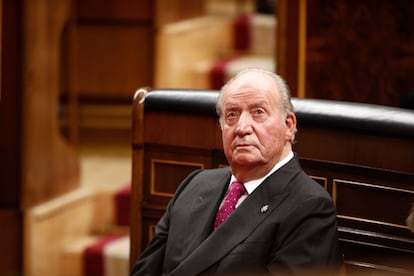UK non-profit considers multi-million dollar donation from fund linked to Spain’s embattled ex-monarch
Joaquín Romero Maura, a trusted aide of former king Juan Carlos, has bequeathed a fortune of uncertain origin to a refugee aid organization. The Jersey-based trust that holds the money was the target of an investigation


Britain’s Refugee Council, a non-profit organization that helps refugees and people seeking asylum in the UK, has received good news: it could soon be the recipient of a multi-million dollar donation. The funds would come from The JRM 2004 Trust, an opaque financial instrument created on the island of Jersey that was the target of an investigation by prosecutors at Spain’s Supreme Court to determine whether the money originally belonged to Juan Carlos I. The former Spanish monarch abdicated the throne in 2014 amid declining popularity, and in August 2020 he fled Spain, where he was being investigated for financial irregularities, settling down in the United Arab Emirates.
The British NGO, which was founded in in 1951, has for weeks now been weighing whether to accept or reject the generous donation of around one million euros a year from an individual named Joaquín Romero Maura, a widower without any children who passed away in June at the age of 81 at a nursing home in Zaragoza, Spain. A former banker with a PhD in history from Oxford University, he was also considered a trusted aide to Juan Carlos and the keeper of one of the latter’s best-kept secrets: the creation in 2004 at 50 Rue La Colombiere in St Helier, the capital of the tiny tax haven in the Channel Islands, of a trust which they named using Romero Maura’s initials, JRM. A total of €14,923,604 was deposited to his name. The origin of this fortune has not been fully clarified.
Due diligence
The Refugee Council’s head office is located in a simple three-story glass building in Stratford, East London, about 40 minutes by underground from the center of London. Since last August, senior officials at the non-profit have been considering whether to accept the donation from Romero Maura, whose last wishes were communicated to them last summer by the legal team that manages the trust, as EL PAÍS has learned.
The presence of a foreign journalist inquiring about Enver Solomon, the chief executive, arouses curiosity among the three employees who are working on the first floor of the building. A friendly worker in charge of social affairs shows up, but puts on a poker face when the reporter explains the reason for the visit: “Have you already received the donation from Mr. Romero Maura, the friend of Spain’s emeritus king?”
The face of Tamsin Baxter, Executive Director of Fundraising and External Affairs, instead reflects serenity and caution. She receives EL PAÍS inside a tiny office with piles of books and brochures on refugee aid stacked on the floor, and acknowledges the donation. “We haven’t received it yet. We are conducting due diligence before making a decision.” She explains that they are obligated to investigate the donor, the origin of the funds and the reasons for the donation when such large amounts of money are involved.
Baxter does not reveal the NGO’s preliminary views on the donation, but says the Refugee Council will make an autonomous decision without consulting the UK government’s Charity Commission, a watchdog agency. According to her, the non-profit has rejected donations in the past. “The investigation into this case in Spain was shelved, wasn’t it?” she asks. “Why did this man choose us? We don’t know. I think he was a person who wanted to help refugees. It is a very significant donation. I can’t tell you more than that.”
If the Refugee Council accepts the gift, a donation of approximately one million euros will be made each year by the trustees until all the money is gone from a €10.6 million deposit in accounts at Investec Bank, in Guernsey, another small island in the English Channel. This would fulfil Romero Maura’s wish, which he detailed in documents that Spanish anti-corruption and Supreme Court prosecutors collected during the course of the investigation. Baxter points out that the amount is in fact less than what is stated in the judicial investigation, but declines to reveal the exact amount.
Prosecutors ultimately shelved these proceedings after finding no evidence linking the JRM 2004 Trust to Juan Carlos I, either as a trustee or as someone with the ability to dispose of the funds. Investigators stressed that the former monarch was never a beneficiary, nor was there evidence that he received any money from it.
Fortune of uncertain origin
The trust’s origins are shrouded in mystery. The investigation did not clarify where the €14.9 million came from, other than the fact that this amount was the result of liquidating two other trusts named Tartessos and Hereu, founded in 1995 and 1997 by Manuel Jaime de Prado and Colón de Carvajal , another close friend of Juan Carlos I who served as senator by royal appointment in Spain’s first Congress following the transition to democracy in the late 1970s. The head of state was at that time the only beneficiary of both financial instruments.
As this newspaper has been able to determine, part of the fortune came from Nadine Limited, a company based in the British Virgin Islands and with an account in Prado’s name at the Chartered Bank. This account received donations from unidentified people who supported Juan Carlos I between the 1950s and 1970s (he became king in November 1975 following the wishes of the dying dictator Franco, who hoped the young royal would carry on with his authoritarian regime). But the bulk of the funds leads to a donation in 1999 of $9 million by Simeon Saxe-Coburg-Gotha, better known as Simeon of Bulgaria, resulting from investments in JP Morgan of Switzerland. The purpose of both trusts was to support the new monarch Juan Carlos I if he were to be deposed by a coup d’état, according to their administrator, the British national John Ruddy.
In December 2003, almost 10 years after Juan Carlos I appeared as the exclusive beneficiary of that hidden fortune, Romero Maura met with Ruddy and the Spanish king and explained that the trusts had lost their initial purpose because the political situation in Spain was stable, but that if public opinion ever found out about their existence “it would be embarrassing for the monarchy.”
As Romero told the managers of the new trust, the Spanish head of state decided to gift him all the money in those funds “in consideration of their friendship of many years and the services provided by his family to the monarchy for generations.” Juan Carlos, he said, had authorized him to use the money as he wished, “including allocating it to other people who may need it, in the same kind of circumstances that King Juan Carlos I found himself in the past.”
Various candidates for charity
The first time that a charity first showed up as a potential recipient of money from the JMR 2004 Trust was on February 10, 2014, a decade after its creation. Romero Maura included as beneficiaries (along with his own name and that of his wife Gudrun Lawetz, who died a year earlier) the British associations Birmingham Children’s Hospital Charity and Great Ormond Street Hospital Children’s Charity. Three years later, on January 23, 2017, he added the Refugee Council to the list and since then the latter has been listed as the sole beneficiary after the recent death of the historian.
But Romero Maura’s intention to benefit a charity was reflected in other documents well before 2014. Since 2005 and in successive letters, he had already informed the trustees that he would be the main beneficiary of the funds during his lifetime, and his wife upon his own death. But he also stressed his desire that after both their deaths, the fortune should be used for charitable purposes and social welfare, with a special focus on children. Documents obtained by prosecutors during the investigation of the trust reflect the meeting that Romero Maura had with two senior officials of the Refugee Council, with the head of the philanthropy department of Barclays Bank and with executives of Zedra Trust Company (Jersey) , one of the administrators of the trust. The donation required a satisfactory review of the accounts of the British charity.
Romero Maura dipped into the trust money on several occasions, according to the prosecutor’s investigation based on the testimony of John Ruddy, the manager of the trust. In the trust’s first year of activity and until March 31, 2005, Romero Maura received nearly $2.5 million from the JRM 2004 Trust and used the money to purchase properties for himself and his wife in the UK and Switzerland. There are at least eight other transactions to his name of about $2.3 million between 2013 and 2016, but none to third parties. In its 22 years of existence, the trust has had very little activity, except for the payment of administrators’ fees.
The third unnamed beneficiary
The JRM 2004 Trust had for several years an enigmatic and possible third beneficiary who was never named. According to a letter dated July 17, 2009 and sent by Romero Maura to the trustees, this beneficiary would only be appointed in the event of circumstances that he defined as "troubled times." This third beneficiary would be a former head of state who had lost that position as a result of a coup or disqualifying circumstance. This individual could be a monarch but also other public servants recognized by a liberal democratic Constitution. The letter instructed that trustees should consult with him, Romero Maura, regarding the identity of this third-party beneficiary, and in case of doubt he proposed that this identity be established following the criteria of the majority of public opinion, expressed by the editors of the top five UK newspapers. The historian asked for $10 million to be set aside for this eventuality.
Tu suscripción se está usando en otro dispositivo
¿Quieres añadir otro usuario a tu suscripción?
Si continúas leyendo en este dispositivo, no se podrá leer en el otro.
FlechaTu suscripción se está usando en otro dispositivo y solo puedes acceder a EL PAÍS desde un dispositivo a la vez.
Si quieres compartir tu cuenta, cambia tu suscripción a la modalidad Premium, así podrás añadir otro usuario. Cada uno accederá con su propia cuenta de email, lo que os permitirá personalizar vuestra experiencia en EL PAÍS.
¿Tienes una suscripción de empresa? Accede aquí para contratar más cuentas.
En el caso de no saber quién está usando tu cuenta, te recomendamos cambiar tu contraseña aquí.
Si decides continuar compartiendo tu cuenta, este mensaje se mostrará en tu dispositivo y en el de la otra persona que está usando tu cuenta de forma indefinida, afectando a tu experiencia de lectura. Puedes consultar aquí los términos y condiciones de la suscripción digital.








































